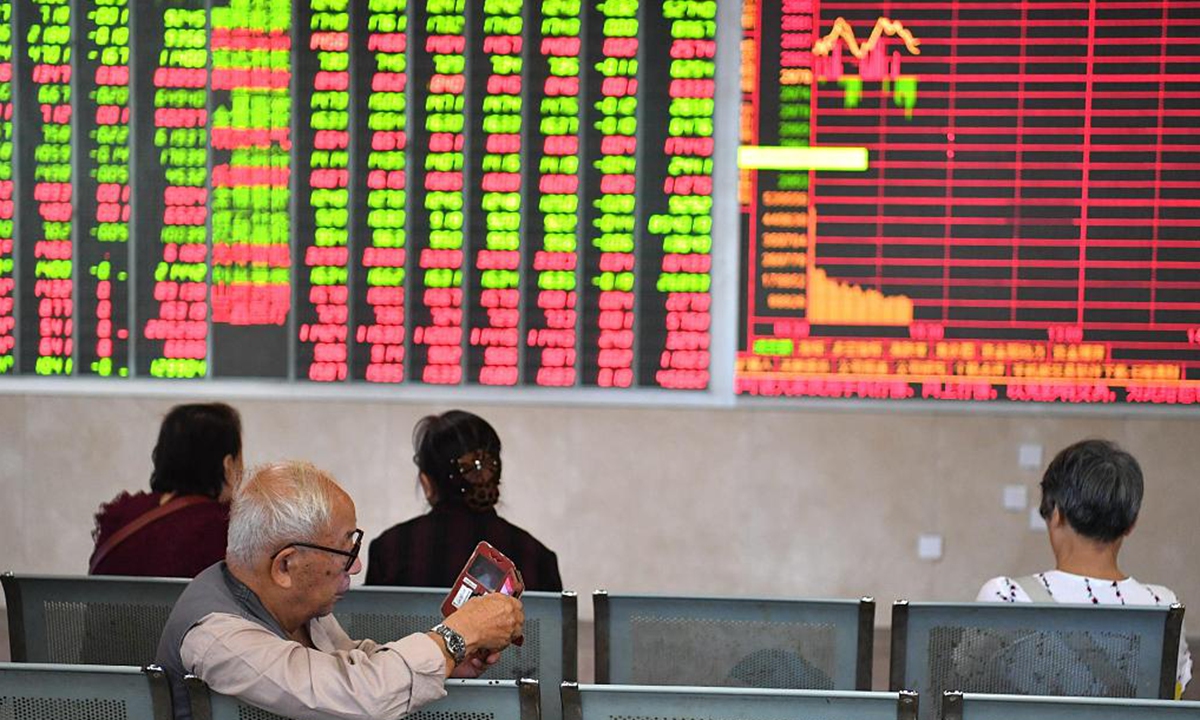
Investors monitor stocks at a trading center in Chengdu, Southwest China's Sichuan Province. Photo: VCG
A handful of Chinese companies have revealed plans for get listed on the Swiss Stock Exchange, as the country pushes for more overseas IPOs.
China has been encouraging its businesses to seek globalized fund-raising despite the US government's regulatory toughening that has targeted Chinese companies for a time, market watchers said, although views remain split over the viability of European listings.
Jürg Schneider, spokesperson for Swiss exchange operator SIX, told the Global Times on Monday that SIX is working with relevant authorities and partner exchanges to progress on the journey started in 2019, after signing of the MoUs with Shanghai and Shenzhen, to establish an attractive Stock Connect system with Chinese exchanges that will allow Chinese companies to tap into the Swiss capital market, while ensuring the highest standards of investor protection.
"Such announcements - as the ones of the various Chinese companies last week - are proof of the interest in SIX and for such a set-up, and we will officially communicate together with the relevant Chinese exchange once the Stock Connect is ready," according to Schneider.
This past week, three Chinese mainland-listed companies - heavy machinery maker Sany Heavy Industry, Lepu Medical Technology (Beijing) and battery maker Gotion High-Tech - disclosed in their filings with the Shanghai and Shenzhen exchanges plans to issue global depositary receipts (GDRs) on the Swiss exchange.
The planned GDR issues instantly put the spotlight on the primary European bourse that sits alongside the London Stock Exchange and Germany's Deutsche Boerse.
Among the reasons for the GDR issues are an accelerated push for internationalization, the leverage of the capital market and improved corporate governance and shareholding structures, the filings said.
Both Sany and Gotion described the GDR plan as a response to the domestic capital market's policy call as part of moves to deepen interconnections between the Chinese and European capital markets and the leverage of overseas capital markets to assist the real economy.
A flurry of interest in the Swiss exchange, in the wake of an expansion of a stock trading link between domestic and overseas stock exchanges to include German and Swiss bourses, indicates that China's capital market has continued to open its doors wider to the outside world and has retained its support strategically for local businesses' IPOs beyond their home turf, Yang Delong, member of the Chief Economist Committee of Securities Association of China, told the Global Times.
The China Securities Regulatory Commission (CSRC) unveiled revised rules in mid-February, which stipulate that eligible businesses traded on the Shenzhen Stock Exchange will be included into the stock link, which previously only comprised firms listed on the Shanghai and London stock exchanges.
Exchanges in Switzerland and Germany also became part of the link, pursuant to the revised rules.
The US has ramped up its regulatory toughening on Chinese shares over the past few years, but China has stayed unfazed with a continued open stance on overseas listings by local firms, Yang said.
Since the US enacted the Holding Foreign Companies Accountable Act in 2020, China has maintained communications with US regulatory authorities and sought effective ways to resolve the issue, market observers said, stressing that the stock linkup expansion has increasingly been seen as a conduit for local firms to rev up their global expansion.
In a fresh avowal of official support, the CSRC crystallized its push for the implementation of the new rules governing overseas listings as the securities regulator championed varied eligible firms' plans for IPOs on overseas exchanges, read a CSRC post on Wednesday.
Nonetheless, such GDRs remain last in line for domestic firms seeking an overseas listing, Hong Hao, managing director and head of research at BOCOM International, told the Global Times on Monday.
Factoring in a scarcity of Chinese shares on European exchanges where investors are largely unfamiliar with Chinese options, local firms tend to put such GDRs on the back burner, Hong said, citing insufficient trading volumes as a frequent issue with such listings.
Thus far, only four GDRs have been issued on the London Stock Exchange via the stock connect linking Shanghai and London exchanges since the linkup's launch in June 2019 - Huatai Securities' trailblazing GDR issuance in June 2019, China Pacific Insurance's GDR listing in June 2020, China Yangtze Power's offering in September 2020 and SDIC Power Holdings' listing in October 2020.
The stock linkup includes both eastbound and westbound trading, with the prior direction consisting of firms listed on foreign exchanges with offerings of Chinese Depositary Receipts (CDRs) in the mainland market.
Mainland-listed firms, for their part, issue GDRs on overseas stock exchanges.
Initially, GDR issuers are capable of fundraising on the overseas markets while CDR issuers can only list CDRs on the mainland exchanges and not raise capital.




